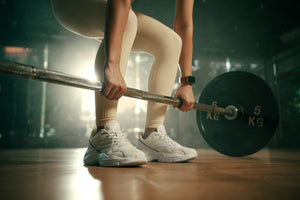There are no shortcuts or “hacks'' when it comes to losing weight or building muscle and strength. Even the best pre workout supplements can only deliver maximum effectiveness if you’re training hard and eating right.
That being said, if we have anything at our disposal that’s close to a “hack” for building muscle and strength, it is lifting heavy weights.
But, improving the way we look and perform just begins to scratch the surface of why lifting weights is so important. To put it bluntly, resistance training is “medicine” for the body and mind.[1]
If you need any more incentive or encouragement why you should lift weights, then pay attention!
What Are the Benefits of Lifting Weights?
#1 Boosts Metabolism & Reduce Body Fat
Research shows that inactive adults lose between 3-8% of their muscle mass per decade. This coincides with a decrease in resting metabolic rate reduction and an increase in fat accumulation.[1]
Furthermore, muscle loss has been identified as “the greatest contributor to the age-related decline in resting metabolic rate (108), which averages 2% to 3% per decade in adults.”[2,3]
Fortunately, lifting heavy weights helps boost your metabolism not only during your workout, but for up to 48 hours afterwards![4] And, by burning more calories during the day (even when you’re resting), you have a greater chance of staying in a calorie deficit, which supports fat loss!
#2 Preserves Bone Mass
Osteoporosis is characterized by a decreased bone mass and an increased risk of fragility fractures. It’s more common in women than in men, but there is a natural loss of bone mass with aging.
Heavy resistance training, however, helps improve bone mineral density and protect against osteoporosis.[5] To get the greatest skeletal benefits from resistance training, you need to lift heavy, really heavy. Research indicates that individuals need to be training with ~80-85% of their 1-rep max in order to stimulate osteogenesis.[5]
If you don’t have access to that much weight, or you’re apprehensive about training with such heavy loads, plyometrics can also be a viable option to improve bone mineral density and bone mass.[6]
#3 Improves Cognitive Function
Regular physical exercise, including lifting heavy weights, stimulates the synthesis of two very important brain proteins -- Nerve Growth Factor (NGF) and Brain-Derived Neurotrophic Factor (BDNF). These two neuroproteins impact the growth, development, and survival of brain cells.
Resistance training also induces neuroprotection and decreases levels of amyloid-Beta (amyloid β) -- a peptide that leads to the development of plaques found in the brains of people with Alzheimer's disease.[7]
It comes as little surprise then that lifting heavy has been shown in research to improve brain performance in a number of ways, including[8,9,10]:
- Immediate recall
- Recognition
- Working memory
- Attention
- Creativity
While any exercise is better for your brain than no exercise, researchers find that lifting heavy 3x/week is superior to training only 2x per week.[11]
#4 Boosts Mood & Reduces Stress
We’ve all experienced that sense of joy and euphoria after setting a new PR or crushing a hard workout. We’ve all also felt the need to hit the gym and “work out” our frustrations.
That’s because lifting heavy weights, and other forms of intense exercise, are a great stress reliever. Research confirms the stress-busting effects of hard workouts, and noted that it can significantly reduce anxiety symptoms, even in healthy individuals.[12]
This is due to the fact that intense physical activity causes the release of several feel-good neurotransmitters, including dopamine, norepinephrine, serotonin, and endorphins.
#5 Increases Longevity
Muscle tissue is the primary site for glucose and triglyceride disposal, so muscle loss specifically reduces the body’s ability to effectively utilize and store glucose, which can have severe long-term ramifications on health, including type 2 diabetes, insulin resistance, and metabolic syndrome.
When muscles are stressed during intense exercise, they rely on glucose as their primary source of energy (after existing ATP and creatine stores are used up). Following training, insulin sensitivity is heightened and muscle energy stores are depleted, which makes them primed and ready to use carbohydrates (including simple sugars like glucose).
Moreover, research finds that resistance training helps reduce the risk of cardiovascular disease and increase longevity in a number of ways, including:
- Lowering blood pressure
- Increasing insulin sensitivity
- Decreasing blood sugar levels & HbA1C
- Increasing HDL (good) cholesterol
- Decreasing LDL (bad) cholesterol
- Increasing lean body mass
- Reducing body fat
The bottom line here is that if you want to live a longer, happier, and fitter life, lift heavy things!
Bonus: Protects Muscle During Dieting
When the body is in a prolonged energy deficit, such as when you’re taking part in a transformation challenge, there is an increased risk for muscle loss. This is due to the fact that muscle is very “expensive” for the body to maintain from a calorie standpoint. Faced with reduced food intake, the body prioritizes survival and essential organ function over maintaining beefy biceps.
Fortunately, there are a few things you can do to protect your muscles from unwanted breakdown (catabolism) when you’re dieting. First and foremost is to make sure that you’re consuming enough protein each day. Generally speaking, when you’re dieting, you want to consume between 1-1.2 grams of protein per pound of body weight. Protein should come from high quality sources, such as:
- Lean beef
- Chicken
- Turkey
- Fish
- Shellfish
- Eggs
- Greek yogurt
- Cottage Cheese
- Protein powder (whey protein, egg white protein, vegan protein powder, etc.)
The other important thing to do when dieting to protect your muscles is lift heavy weights. Resistance training sends a powerful signal to your body that it needs all that strong, lean muscle tissue to handle the rigors and stresses of the day.
Takeaway
Lifting heavy weights is one of the most important things you can do in life. It helps build muscle, burn fat, improve cognitive function, boost mood, and reduce your risk of several lifestyle diseases.
If you’re already consistently lifting heavy weights each week, that’s great! Keep on going!
If you’re not, then hopefully the benefits outlined above will encourage you to be more consistent with your resistance training workouts.
And, if you need help figuring out an effective workout routine for your goals and preferences, then download the 1UP Fitness App where you’ll receive FREE customized training plans!
References
- Westcott WL. Resistance training is medicine: effects of strength training on health. Curr Sports Med Rep. 2012 Jul-Aug;11(4):209-16. doi: 10.1249/JSR.0b013e31825dabb8. PMID: 22777332.
- Phillips SM. Resistance exercise: good for more than just grandma and grandpa’s muscles. Appl. Physiol. Nutr. Metab. 2007; 32:1198Y205.
- Keys A, Taylor HL, Grande F. Basal metabolism and age of adult man. Metabolism. 1973; 22:579Y87.
- Williamson DL, Kirwan JP. A single bout of concentric resistance exercise increases basal metabolic rate 48 hours after exercise in healthy 59-77-year-old men. J Gerontol A Biol Sci Med Sci. 1997 Nov;52(6):M352-5. doi: 10.1093/gerona/52a.6.m352. PMID: 9402941.
- Hong AR, Kim SW. Effects of Resistance Exercise on Bone Health. Endocrinol Metab (Seoul). 2018 Dec;33(4):435-444. doi: 10.3803/EnM.2018.33.4.435. PMID: 30513557; PMCID: PMC6279907.
- Vetrovsky T, Steffl M, Stastny P, Tufano JJ. The Efficacy and Safety of Lower-Limb Plyometric Training in Older Adults: A Systematic Review. Sports Med. 2019 Jan;49(1):113-131. doi: 10.1007/s40279-018-1018-x. PMID: 30387072; PMCID: PMC6349785.
- Rukmangadachar LA, Bollu PC. Amyloid Beta Peptide. [Updated 2023 Aug 28]. In: StatPearls [Internet]. Treasure Island (FL): StatPearls Publishing; 2023 Jan-. Available from: https://www.ncbi.nlm.nih.gov/books/NBK459119/
- Rominger C, Schneider M, Fink A, Tran US, Perchtold-Stefan CM, Schwerdtfeger AR. Acute and Chronic Physical Activity Increases Creative Ideation Performance: A Systematic Review and Multilevel Meta-analysis. Sports Med Open. 2022 May 6;8(1):62. doi: 10.1186/s40798-022-00444-9. PMID: 35523914; PMCID: PMC9076802.
- Azevedo, C. V., Hashiguchi, D., Campos, H. C., Figueiredo, E. V., Otaviano, S. F. S. D., Penitente, A. R., Arida, R. M., & Longo, B. M. (2023). The effects of resistance exercise on cognitive function, amyloidogenesis, and neuroinflammation in Alzheimer’s disease. Frontiers in Neuroscience, 17(March), 1–8. https://doi.org/10.3389/fnins.2023.1131214
- Landrigan, J.-F., Bell, T., Crowe, M., Clay, O. J., & Mirman, D. (2019). Lifting cognition: a meta-analysis of effects of resistance exercise on cognition. Psychological Research. doi:10.1007/s00426-019-01145-x
- Li Z, Peng X, Xiang W, Han J, Li K. The effect of resistance training on cognitive function in the older adults: a systematic review of randomized clinical trials. Aging Clin Exp Res. 2018 Nov;30(11):1259-1273. doi: 10.1007/s40520-018-0998-6. Epub 2018 Jul 13. PMID: 30006762.
- Gordon BR, McDowell CP, Lyons M, Herring MP. The Effects of Resistance Exercise Training on Anxiety: A Meta-Analysis and Meta-Regression Analysis of Randomized Controlled Trials. Sports Med. 2017 Dec;47(12):2521-2532. doi: 10.1007/s40279-017-0769-0. PMID: 28819746.





